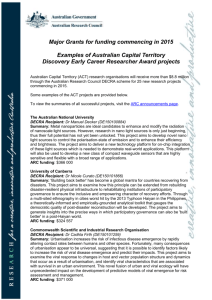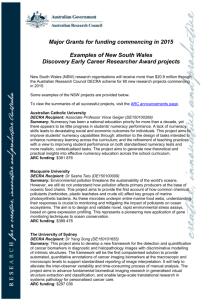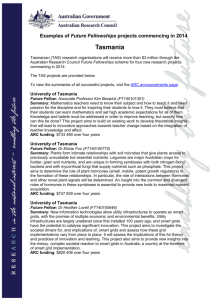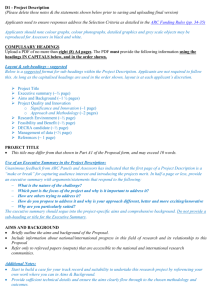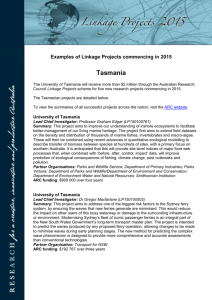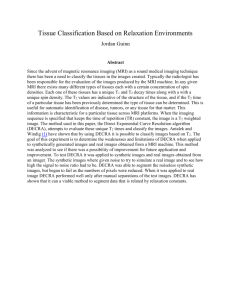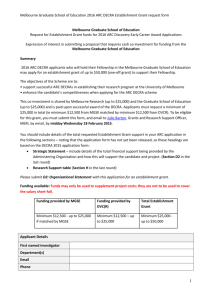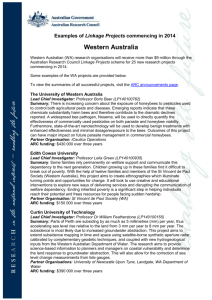Word Format - Australian Research Council
advertisement
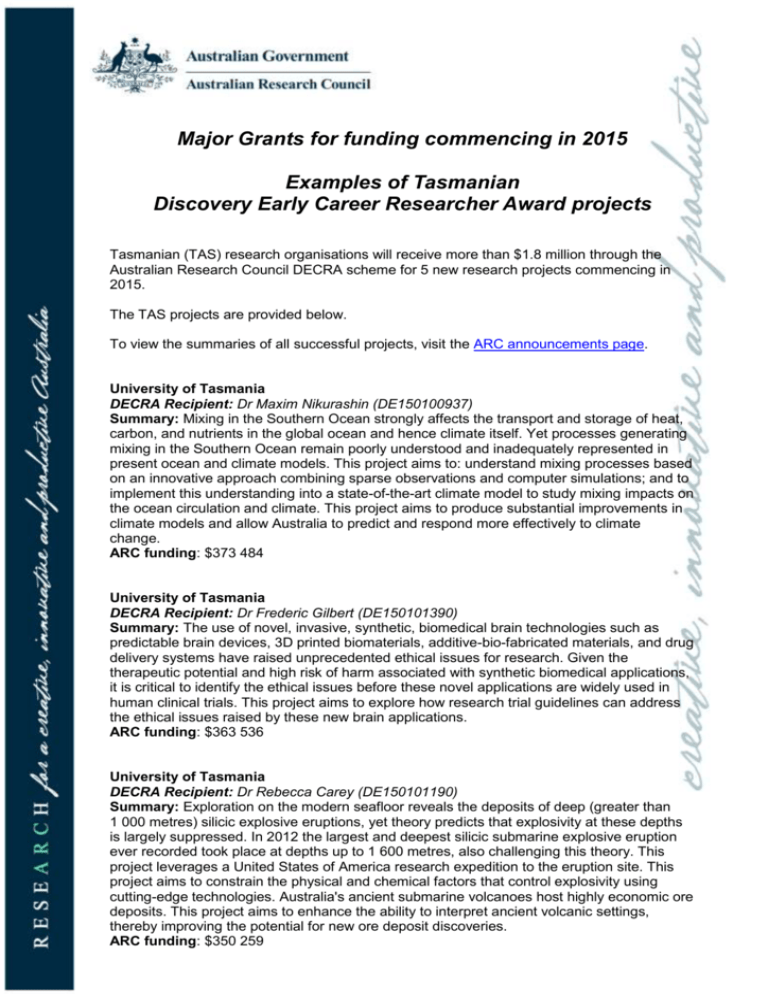
Major Grants for funding commencing in 2015 Examples of Tasmanian Discovery Early Career Researcher Award projects Tasmanian (TAS) research organisations will receive more than $1.8 million through the Australian Research Council DECRA scheme for 5 new research projects commencing in 2015. The TAS projects are provided below. To view the summaries of all successful projects, visit the ARC announcements page. University of Tasmania DECRA Recipient: Dr Maxim Nikurashin (DE150100937) Summary: Mixing in the Southern Ocean strongly affects the transport and storage of heat, carbon, and nutrients in the global ocean and hence climate itself. Yet processes generating mixing in the Southern Ocean remain poorly understood and inadequately represented in present ocean and climate models. This project aims to: understand mixing processes based on an innovative approach combining sparse observations and computer simulations; and to implement this understanding into a state-of-the-art climate model to study mixing impacts on the ocean circulation and climate. This project aims to produce substantial improvements in climate models and allow Australia to predict and respond more effectively to climate change. ARC funding: $373 484 University of Tasmania DECRA Recipient: Dr Frederic Gilbert (DE150101390) Summary: The use of novel, invasive, synthetic, biomedical brain technologies such as predictable brain devices, 3D printed biomaterials, additive-bio-fabricated materials, and drug delivery systems have raised unprecedented ethical issues for research. Given the therapeutic potential and high risk of harm associated with synthetic biomedical applications, it is critical to identify the ethical issues before these novel applications are widely used in human clinical trials. This project aims to explore how research trial guidelines can address the ethical issues raised by these new brain applications. ARC funding: $363 536 University of Tasmania DECRA Recipient: Dr Rebecca Carey (DE150101190) Summary: Exploration on the modern seafloor reveals the deposits of deep (greater than 1 000 metres) silicic explosive eruptions, yet theory predicts that explosivity at these depths is largely suppressed. In 2012 the largest and deepest silicic submarine explosive eruption ever recorded took place at depths up to 1 600 metres, also challenging this theory. This project leverages a United States of America research expedition to the eruption site. This project aims to constrain the physical and chemical factors that control explosivity using cutting-edge technologies. Australia's ancient submarine volcanoes host highly economic ore deposits. This project aims to enhance the ability to interpret ancient volcanic settings, thereby improving the potential for new ore deposit discoveries. ARC funding: $350 259 University of Tasmania DECRA Recipient: Dr Nathan Kilah (DE150100263) Summary: The properties of substances we experience in our daily lives owe much to very weak interactions taking place between molecules. Consider a cup of coffee: very weak interactions hold the water together as a liquid, and result in the biological action of caffeine within the body. The project aims to develop new materials based on an underexplored class of weak interactions known as halogen bonds. These interactions will be used to assemble large molecules in solution, probe the presence of pollutants in water, and to separate active and inactive forms of pharmaceuticals. The development of health and environmental applications in the course of this project aim to significantly enhance our fundamental understanding of these weak interactions. ARC funding: $373 536 University of Tasmania DECRA Recipient: Dr Geoffrey While (DE150100336) Summary: The project aims to connect processes occurring across levels of biological organisation to provide a unified understanding of why animals live together. Evolutionary transitions to and from complex social behaviour appear linked to female multiple mating (polyandry). However, the causal pathway by which variation in polyandry results in the emergence and diversification of sociality is yet to be established. This project aims to combine empirical, theoretical and comparative approaches to address this. It will test: the environmental causes of individual variation in polyandry; its effect on social behaviours that promote social complexity at the population level; and how this corresponds to divergence in social complexity across species. ARC funding: $369 453
